Kellie Curtain [00:00:07] Let's be Upfront about living with metastatic breast cancer. It's not without its challenges but indeed people can and do live well for many years. Metastatic breast cancer, which is also referred to as Stage Four, is when the disease has spread from the breast to another part of the body. It's not curable but there are treatments that can help manage it and importantly provide a good quality of life. In this edition of Upfront we're going to get medical insight into how health professionals weigh up the balance. And we welcome oncologist and BCNA board member Professor Fran Boyle.
Fran Boyle [00:00:42] Good morning.
Kellie Curtain [00:00:43] And to talk about some of the day to day challenges of living with metastatic breast cancer and perhaps share some helpful hints is Rachelle Gebert, a mother of two who was diagnosed with metastatic breast cancer in 2016 at the age of 36. Welcome to you.
Rachelle Gebert [00:01:00] Thank you.
Kellie Curtain [00:01:02] So Fran what would you say is the key to be able to live well with metastatic breast cancer?
Fran Boyle [00:01:16] I think one of the keys, Kellie, is to realise that you're going to live well if the disease is under control and also if your symptoms are under good control and both of them are as important as one another. So it's no good saying "I'm going to have a massive amount of chemotherapy and I don't care what happens in terms of side effects and I'm not worried about pain, I'm not gong to do anything to do with that. I'm just going to of focus on the cancer." That's not going to give you the best quality of life. The best quality of life will come - and probably the best survival too - from thinking about treatment effects, side effects and your symptoms as being equally important. And the fourth part of that is your brain space or your headspace and if you can't actually get help for all of those things then something's going to be a little bit out of kilter and you won't do as well as you might otherwise have done.
Kellie Curtain [00:02:16] When you say survival, that's going to mean different things to different people isn't it?
Fran Boyle [00:02:23] Well it is. And I'm just thinking about Rachelle who is obviously young and has young children and for her every six months that she spends with her family there's another milestone isn't there?
Rachelle Gebert [00:02:35] Completely.
Fran Boyle [00:02:35] Sounds like your son's gonna be maybe starting school in a little while, so for her maybe the absolute priority at the beginning feels like it's staying alive as long as possible.
Kellie Curtain [00:02:46] Yep.
Fran Boyle [00:02:46] And there might be the temptation, correct me if I'm wrong, to say my symptoms aren't matter, side effects don't matter, just chuck it at me because I need to stay alive. But when you have a small child you also need to be switched on 24/7. You need to be able to function. You need to be able to enjoy that time. And so it is just as important really to manage your symptoms. What do you think?
Rachelle Gebert [00:03:10] Yeah. Yep definitely. Because you know, I guess people talk about trying to live a normal life and managing the symptoms helps you live a normal life and do the things that you were doing before you were diagnosed. So yes it's tough to keep all of that under control and especially just dealing with the everyday things that you have to do with young children. They've got lots of energy. They're very demanding. They think the whole world revolves around them. So it's that emotional ... You know the emotionally draining sometimes and even though you love them and you want to do everything with them ... Sometimes you just don't want to be around them!
Fran Boyle [00:03:56] You need time out.
Rachelle Gebert [00:03:58] You can't handle it! [Laughing!] Yeah.
Kellie Curtain [00:04:00] So what is normal for you?
Rachelle Gebert [00:04:04] So yeah I guess before we were just talking before we started recording. I was working part-time, my kids were in childcare and at school. But when I was diagnosed I had to, well I didn't have to, I chose to stop working to focus on my health. And you know get all of that under control and I guess yeah just feeling like I wasn't going to survive the next 10 years.
Kellie Curtain [00:04:39] So that's dealing with a shock.
Rachelle Gebert [00:04:40] Yeah exactly. And I think that takes a long time to deal with the shock. So for me at the moment normal is being available to do pick ups and drop offs and be involved with the school. You know taking advantage of opportunities like this to do some advocacy, sharing my story, that makes me feel better. Prioritizing exercise. I think that that helps me physically and mentally. And I know that you know studies have shown that exercise has to be part of our treatment. So yeah I think just similar to what a normal stay-at-home parent would experience.
Kellie Curtain [00:05:31] The use of the word normal, Fran, even though someone's been diagnosed with metastatic breast cancer it's now considered more a chronic illness. As... Well it is a terminal disease but people can live for many many years.
Fran Boyle [00:05:49] I was looking up some chronic illness memes on Facebook the other day for a talk that I was giving about metastatic breast cancer and I found a wonderful one that said "the only person who thinks it's great to have a chronic illness is someone who's never had one". And I have suffered from chronic pain now for at least the last five years and that's different from severe pain I had when I was younger in my 30s but that got fixed with surgery so it was bad for a year but then it got better. And that difference between knowing that more or less no matter what you do with treatment or surgery or drugs you're going to have to keep dealing with that problem means that there actually is no normal life. You have to juggle an extra ball and it's almost as if you were juggling work and family and exercise and so forth and you're handed this extra ball which is something you don't want. And you've either got to juggle really fast or you've got to put something down temporarily so that you can manage that extra issue which is your chronic health problems. And for me that meant cutting back work, reducing flying, I have to be able to say to people "no I've worked my 60 hours, I'm going to have a lie-down now" and to take my medication really religiously. And so that's a little bit similar for many women dealing with metastatic breast cancer. They probably are going to have to put something else down in their lives at least temporarily until they get better at juggling and their symptoms improve and then they may be able to pick up that work ball again. But maybe part time not full time maybe not the CEO but maybe some position that's got more boundaries around it that isn't on call 24/7 because particularly if you're a mom of young children that's probably going to be prioritized in your decision making ahead of perhaps really long term career prospects. But for some women the financial pressures are so strong that they really hammered on both sides. And in that circumstance they might find their exercise is something I just can't do a full on. All I need a treatment that's a bit simpler and has fewer side effects. So all of that goes into the mix of working out for that particular woman and her family what's the best way to go.
Kellie Curtain [00:08:24] On the upside it's good to know for people who do want to continue working that that is a very real possibility with metastatic breast cancer.
Fran Boyle [00:08:35] I think it is. Depends a bit on the type of work. If it is very physically demanding work that may be challenging if it involves a lot of flying Jetstar that might be feeling quite challenging because it's nothing like an airline seat to make your back hurt. And if it's something where you have no control of your work environment. For instance you're working at a check out. You know everything works on 20 minute scheduling and you want to get one toilet break every two hours. Your treatment is causing diarrhoea that's unpredictable. That may be really quite hard for you. So again your oncologist needs to know what's your work like, what's its flexibility and how can we plan to avoid side effects that might be a problem for you by choosing a treatment in a different way or protecting you from side effects.
Kellie Curtain [00:09:27] Speaking of side effects pain is a very big issue to face with many diseases including breast cancer.
Rachelle Gebert [00:09:38] Yeah for me I guess because the metastases in my bones that has been quite difficult for me to get used to managing the pain and taking my pain medication. Knowing what works for me and taking it when I need it because it's... There's no point once you've got the pain. It's it's all about managing the pain and keeping it at bay which can help you to your normal. I keep saying normal but just doing the things that you want to do.
Kellie Curtain [00:10:15] But you've still got to to be able to function.
Rachelle Gebert [00:10:17] Yeah exactly. Yeah. So it's just trying to find that balance, but I guess for other people it might be different things that might not be pain, it might be lymphoedema. It might be ...you know I'm not sure what other side effects other people would have if they've got liver mets or lung mets. And so it's all you know different. Trying to work out which medications or your other medications that go along with your cancer medications to help you yeah, keep going on as well as you can.
Fran Boyle [00:10:55] A lot of people actually say to me that they're very frightened about taking opioids. Morphine related drugs or oxycodone or something like that for their pain and commonly raise this fear of addiction. And what we find in people with cancer pain is that addiction is very very rarely a problem. If the pain is there it soaks up the drug. And so it's not like you can get high from it. I wish I was! That'd be nice. And as the pain gets smaller as treatment works or radio therapy kicks in then you just gradually reduce the dose of the opioids. And if the pain goes away completely you just stop them. So people don't get psychologically dependent on opioids in the cancer context hardly at all. Very rarely a problem. Opioids are actually the only drugs that we know of that have no top dose. So sometimes people worry "if I have it now in my pain's not too bad, will they still be drugs for me when I'm dying?" And the answer is "you betcha!" Because they're the only drugs you can just slide up as much as you need or back down again. So that really is a common fear but it's unfounded. And making sure that you get the wrong advice about your pain's important. Cancer Council's got some really excellent books and information about that and very much be the case that when you need specialized advice about pain management that's where palliative care teams can be helpful but also chronic pain services often look after people with cancer as well.
Kellie Curtain [00:12:30] What about fatigue? That must be a big issue.
Fran Boyle [00:12:34] Fatigue is a real problem and I don't really think we've cracked that yet. Controlling the cancer does improve fatigue by and large, but many of our drugs also have fatigue as a side effect. Sometimes that's caused by anaemia and of course you can transfuse people in that circumstance which helps, and sometimes it's caused by sort of off-suite things like your thyroid being out of whack or something like that. So it's important to check that there's not some other condition causing it. One of the things that Rachelle alluded to was exercise and it's kind of counterintuitive but exercise is actually really important to combat fatigue. You found that.
Rachelle Gebert [00:13:14] Yeah. Completely. I think because I guess to have a little bit of fear... When you're in a lot of pain like I was when I was first diagnosed and you're fearful of what you can and can't do, so then you pull back from everything. And I guess exercise is another one of those things. But I was just really grateful that I took that opportunity from the BCNA to be part of a 12 week program with an exercise physiologist. So then I used my five sessions that I was eligible for with a chronic disease management plan. Health insurance made up the difference in cost and I was able to work out ... have personalized because it was just one-on-one work out what I could and couldn't do to start exercising again. And then I think I just became more confident with that. And I've just really surprised myself with what I can do. Doing strength classes knowing that I need that for my bone health. Also you know during pilates because I know that that would help strengthen my core and then not let my back feel, you know, as in as much pain because I'm feeling stronger in that area. And then setting some goals. So you know last year a group of friends and I took part in the Bloody Long Walk and we walked 35 kilometres and in May we are participating in Coast Trek and we're going to walk 60 ks and so..
Fran Boyle [00:14:58] Amazing!
Rachelle Gebert [00:14:58] I hope I can get there. I'm trying.
Kellie Curtain [00:15:05] When people hear that you have metastatic breast cancer ... You look really well. And I think that can be quite deceiving, can't it? Do you find that people forget that you actually have a terminal illness?
Rachelle Gebert [00:15:19] Yes. I think sometimes it can be the relations.... I think there's two types of people the people that want to talk about cancer and the people who don't want to talk about cancer. So I guess it's hard when you encounter the people that can be friends or family that don't want to talk about cancer. So they don't really acknowledge it. And then that can be difficult because you want them to ask you how you are and what's going on. Then you've got other people who are just such a great support. They will just talk about it. They ask questions you know nothing is off limits. And you know that can be quite comforting. But I think one of the hardest things is when people say "you look well". Because you're thinking, well I do look well I look normal. I look at myself in the mirror and I look normal. But on the inside I'm not normal. You know, that day I might be feeling nauseous and it is just completely annoying me. But when people come out and just make a statement you feel as though it's their way of saying "I've acknowledged what's going on". But perhaps it could be better if they asked an open ended question ... Open ended question of "how are you feeling? How are you managing your side effects?". You know things like that because you you feel as though they're willing to listen if they ask a question like that rather than saying "you look well". It's closed, let's shut.
Fran Boyle [00:17:01] Shut it down. Shut it down.
Rachelle Gebert [00:17:03] Yeah.
Fran Boyle [00:17:03] Well I think it's common. I find that people go "oh you're upright, yeah, excellent." You can't see what it's taking to keep me upright. You can't see the bolts and batteries and you know it's full of drugs and that's the same for Rachelle. Both of us actually look pretty well. And you wouldn't know for either of us that there was a lot of activity going on underneath the surface. So I think finding those people who are the ones who really get it sometimes comes from a support group and sometimes comes from an online community. So I belong to an online community of people with chronic pain that's not cancer related. It's great to see on my Facebook somebody saying "yeah I managed to conquer this goal this week". Rachelle I think maybe has been involved with one of the support groups here. But also the BCNA online community can give you the people who get it and hopefully in your family or friends there's someone who gets it and who realizes this when you're feeling vulnerable and is prepared to go that extra mile, make the kids dinner you know mow your lawn, put a pot of spaghetti bolognese on for you whatever it is. Because that compassion fatigue that we sometimes see set in for people who are looking after those with chronic health conditions. Everyone gets tired and so making sure you've got that little support around you. You know your team if you like. So it's not just one person wearing out a partner or a friend.
Kellie Curtain [00:18:35] Have you found that helpful. Rachelle How do you manage day to day because. Even though we've just said you look well. It must weigh heavily on you emotionally.
Rachelle Gebert [00:18:49] Completely. I think that's probably the most difficult side of living with metastatic breast cancer. Just the psychological. You think about it all the time. You are. You have to be patient because you you know you've got to wait to see if treatment works. You know you can't have scans too often. So you just have to just sit and wait and make sure that everything is going okay. Yeah. As we said finding the right people doing different things and getting what you need from different people because sometimes you might be in a support group but you don't necessarily have to like it or everyone in there or you might not have the same life experiences. I think some of the face to face groups that I've had or even the online ones as well. A lot of the women can be older than me and there's you know I've learned a lot from them as well but they're not necessarily dealing with young children.
Kellie Curtain [00:19:53] What about your partner. That must weigh heavily on him how do you as a couple address the fact that you do have young children?
Rachelle Gebert [00:20:03] Yeah I think that we try and which is hard. And I think that's hard for anyone with young kids is making time for each other. Just the two of us. But then we do set plans to do things. We after I was diagnosed we booked a trip to New York. Just the two of us and we were lucky enough for our families. My in-laws and my mum to step in and look after the kids for two weeks. And that was just a great experience for us because we felt like we could do everything that we wanted to do. Without worrying about catering to the kids and what they wanted to do. So that just gave us confidence that we know that we could do that again. Sometimes I might I might not talk to my husband about how I'm feeling because I might receive more support from a girlfriend or the online support groups because my husband and I might just talk about everyday stuff. But. And I guess he doesn't he doesn't talk much either. But I did ask him I said I said. "do you worry about me?" You know because he doesn't give away much. So I asked him if he worried about me. He said every day he thinks about it every day. Even though he might not communicate it with me.
Kellie Curtain [00:21:31] So you had the tough discussion further down or is that something that you save for further down the track.
Rachelle Gebert [00:21:38] Nah I think it's something that we have to confront all the time. It's been a little while but we did. We do see my psychologist together we go see her together and he's always available to come to my appointments with me so he knows what's going on.
Kellie Curtain [00:21:58] And if you found that really helpful having the psychological support?
Rachelle Gebert [00:22:02] Yeah but I think it's a combination of things. Like I said I haven't made an appointment for a while but that's just one part of it. Like I said it's still the online support groups, the exercise, having girlfriends who are willing to listen. It's anti-depressants you know or all of that.
Kellie Curtain [00:22:23] And Fran from a medical point of view people can often be scared again of anti-depressants but is it a case of finding what works for you to give as long a quality of life as you can get for however long?
Fran Boyle [00:22:42] That's absolutely critical actually because your mood will influence so many things that can impact on survival. So if your mood is really low then having the motivation to eat well, to exercise, to reach out for help, having the motivation to try new treatment options when they come up - that falls away and your self-esteem goes really through the floor and that has a massive impact on quality of life. Untreated depression is something that we are very concerned about in this context. Anti-depressants can help with pain management and there are particular anti-depressants that do that more so than others. They can help with sleep and they can help with activity and appetite and they can also help people to achieve some of those goals which I think as you've heard is very important. Having said that there are some anti-depressants that don't go well with particular anti cancer drugs and there are some antidepressants that have side effects that may actually make other side effects worse: for instance constipation, dry mouth that sort of thing. So if your oncologist is not very confident choosing the right antidepressant for you then ask to see a psychiatrist because there are psychiatrists who are experienced in choosing these drugs well for people who have other medical conditions and getting the right specialist advice is very important. Backup is your psychologist so paying someone to listen to you for an hour. I can really recommend because it's pretty rare that your spouse will do that under any circumstances and even your girlfriends will probably fail at about half an hour so paying someone that money and of course you can get that covered with a mental health plan from your GP. Get Medicare rebates for that and a psychologist who knows about cancer I think can be someone who provides that listening ear but also techniques to manage fear, very important, panic, anxiety, because all of those things magnify pain. And if you can learn to meditate if you can learn to when you're starting to hit the panic button just drop the anchor and re-centre yourself then you'll stop that upwards pain spiral that gets people into trouble.
Kellie Curtain [00:25:05] So what I'm hearing here that the importance of communicating with all your health professionals what medications you're on what symptoms you're having even though you think that they may not be relevant. So if you're thinking that you just really tired but you're just saying that that can escalate pain that so many other things can have an adverse reaction but all or most can be managed if you're open. So that you can make a collective decision. And I assume that's with your desire to try different treatments, including natural remedies so that everyone is on the same page and therefore can make the right decision for you as opposed to just having some pieces of the jigsaw and therefore not getting the full picture.
Fran Boyle [00:25:53] I think that's really true and the managing metastatic breast cancer is a team game. That's the team at home, the team at the hospital, your GP. It can include any of the acupuncturists that you're seeing, your pilates instructor, your exercise physiologist, a physiotherapist, your palliative care team if that's important. So keeping all of that in there is challenging and for many patients they find that one role a spouse can play is helping to manage bills or helping to manage appointments or helping to manage particular activities around what you need to coordinate your care. Making sure your scripts don't run out of date, that sort of thing. So that's one of the reasons why it might be important to cut back on work get some extra household help or some extra childcare so that you can make sure that managing those aspects of your illness is as trouble free as it can be and not a source of extra stress
Kellie Curtain [00:26:58] For you Rachelle, what has been your greatest learning. From your experience so far you perhaps want to share with someone else going through metastatic breast cancer?
Rachelle Gebert [00:27:12] Oh it's hard to say because I sometimes I don't know if I'm doing it well in terms of the psychological part of it because it it is really difficult. And I think maybe in time it will get better. But yeah some days I'm completely fine and there are other days it just all gets to me. Especially when you've got scans coming up or you know there's different markers that are not quite right but you're just waiting to see what happens. You're just not sure if this treatment is working. As you were just saying about the you know working with your medical team and you're everyone working as a team and I'm being open about what you're feeling. Sometimes you really heightened to everything that's going on in your body and it might not necessarily be the cancer it could just be a normal infection but it's trying to manage that side of it as well and not assuming that everything is cancer. But still keeping on top of everything.
Fran Boyle [00:28:27] It's that sudden medical oncology training that you need to just quickly catch up on isn't it.
Rachelle Gebert [00:28:32] Yeah. Yeah.
Fran Boyle [00:28:33] You know people with metastatic breast cancer are more prone to infection and more prone to clotting. And sometimes in fact the things that die from are uncontrolled infection or uncontrolled clotting rather than the cancer itself. Really important SOS - you got a fever. We need to know about it. You suddenly short of breath after getting off a plane not Jetstar. Yeah. We need to know about it. So managing the other aspects of your health is very much a challenge. So knowing where to press the panic button if you need to get help after hours because you're suddenly unwell is just as important as calming yourself on other days. Many people say they've had to learn to live in the moment and not to plan too far ahead. And that's probably a lesson for all of us. That is always a challenge especially if in the kind of person who is a planner and not sweating some of the small stuff is probably another thing that women often say to me things I used to worry a lot about just don't matter anymore. They focussed a lot more on what's actually important to them.
Kellie Curtain [00:29:43] And women are typically resilient so I think the other messages is don't feel like you have to do it alone.
Rachelle Gebert [00:29:48] Oh definitely not. Definitely not. You can't do it alone because then that would probably drive you into deeper depression that you you know, be trying to think that you can do it on your own. You just can't. You need to draw on all your supports.
Kellie Curtain [00:30:08] And there's always BCNA's helpline and online network. Thank you both for joining us on upfront. A proud production of Breast Cancer Network Australia with thanks to Cancer Australia. If you want to know more about how to live with metastatic breast cancer there are links to some great resources on our website. This podcast is intended to provide information suggestions and discussion. The opinions of our guests are welcome welcomed but not necessarily shared by BCNA. And we'd love to know your thoughts too so leave us a message on our Facebook page. I'm Kellie Curtin. Thanks for being upfront with us.


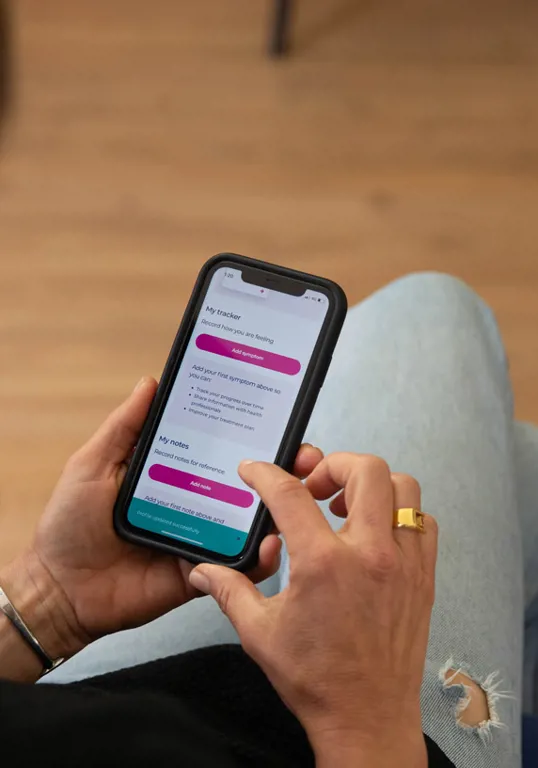




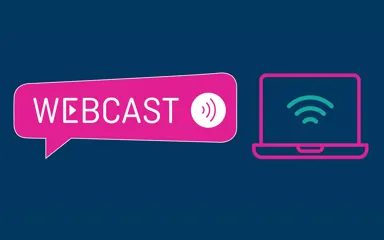
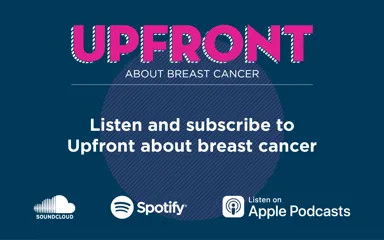
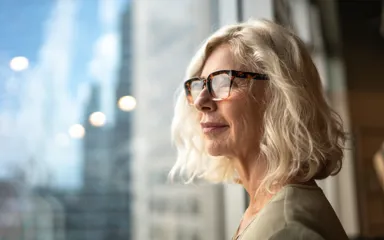

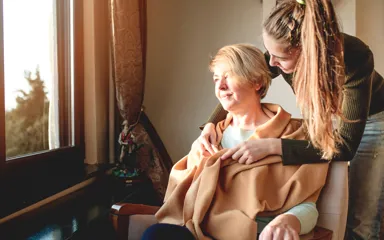
![[blank]](https://bcna-dxp.azureedge.net/media/en2fczb2/bcna_placeholder_bg.jpg?rxy=0.7593219354887106,0.2881619937694704&width=384&height=240&format=webp&quality=80&rnd=133546802863430000)





![[blank]](https://bcna-dxp.azureedge.net/media/en2fczb2/bcna_placeholder_bg.jpg?rxy=0.7593219354887106,0.2881619937694704&width=64&height=64&format=webp&quality=80&rnd=133546802863430000)
Listen on